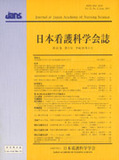Japanese
English
- 販売していません
- Abstract 文献概要
- 参考文献 Reference
- サイト内被引用 Cited by
要旨
目的:重度の脊髄損傷患者と関わる看護師の感情体験を明らかにすること.
方法:主に重度の脊髄損傷患者の看護に携わったときの感情体験について,看護師6名を対象に半構成のインタビューを実施し,質的帰納的に分析した.
結果と結論:脊髄損傷患者の看護に関わる看護師の感情として,【攻撃的な感情】【突き放した感情】【疲弊した感情】という否定的感情があり,これらの感情に揺らぎながらも対処行動として【物理的距離の調整】と【精神的距離の調整】をすることで,感情のバランスを保ち看護師としての職務を遂行していた.そして患者に【思いやる感情】を持ち,看護師は患者からの学びや自己の成長を感じながら【充実した感情】を体験していた.
否定的感情は,看護師の患者の自立への期待やその支えになりたいという思いと患者の状況との間の不調和が影響していた.また,脊髄損傷という疾患の特徴から看護師は主に情動中心型の対処行動を取る傾向があった.感情体験をスタッフ間で共有するだけではなく,その感情の意味を考え,実際の看護に生かしていく試みが必要である.
Abstract
Purpose:The purpose of this study was to clarify the emotional experiences of nurses caring for patients with serious spinal cord injury.
Method:Participants were six nurses caring for patients, most of whom had serious spinal cord injury. Data were collected by semi-structured interview and analyzed by using qualitative inductive methods.
Results and Conclusion:Nurses caring for patients with spinal cord injury experienced negative emotions of “aggression,” “detachment,” and “exhaustion.” Although nurses suffered waves of these negative emotions, they kept their emotions in balance and performed their nursing duties by using coping behaviors, including “adjustment of physical distance” and “adjustment of mental distance.” They felt “sympathy” toward patients and experienced a “sense of fulfillment” in learning from patients and feeling their own personal growth.
The gap between nurses' expectations of the patients' ability to achieve independent living and the patients' situations influenced the nurses' negative emotions. Nurses mainly tended to use emotion-focused coping to deal with the consequences of spinal cord injury. It is important that nursing staff not only share their experiences, but also think about the meaning of the emotions that they experience and attempt to make the best use of their nursing practice.
Copyright © 2011, Japan Academy of Nursing Science. All rights reserved.


